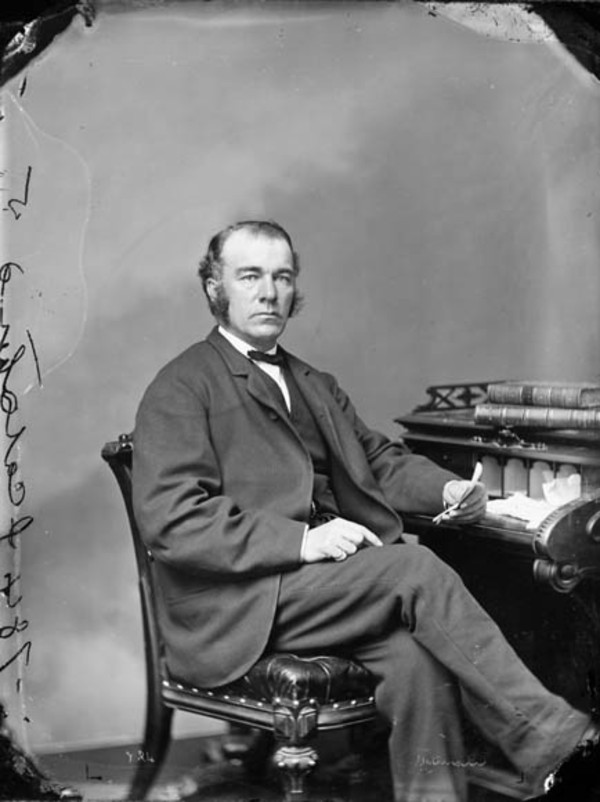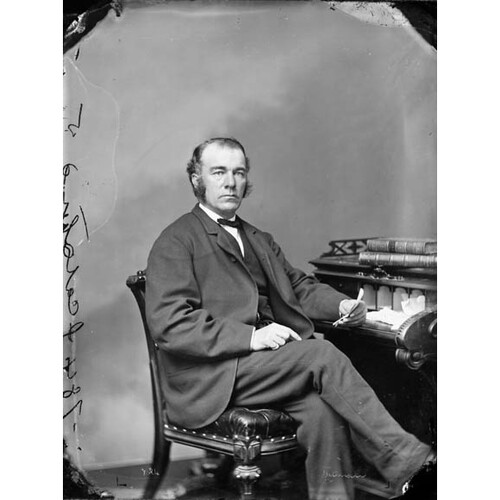SCATCHERD, THOMAS, lawyer and politician; b. at Wyton (Station), U.C., 10 Nov. 1823, eldest of 12 children of Anne Farley and John Scatcherd, who emigrated from Yorkshire in 1821 and became member for Middlesex West in the Legislative Assembly of the Province of Canada, 1854–58; d. at Ottawa, Ont., 15 April 1876.
Thomas Scatcherd attended the London District grammar school, then articled in London with William Horton and in Toronto. He was town clerk for London, 1845–46, and began the practice of law in London in 1848. In 1849 he became solicitor for the town, a post he held for the rest of his life. In partnership, first with Ephraim Jones Parke and from 1861 with William Ralph Meredith*, he established an extensive legal practice. In 1851 he married Isabella Sprague, and they had two sons.
In politics, Scatcherd’s unbroken record of electoral success began when he ran in Middlesex West in 1861, returning to the Reform cause the seat which had been lost to the Conservative party after his father’s death in 1858. Re-elected in 1863, he supported the Clear Grit positions developed in the 1850s. He broke party ranks on the coalition of 1864, opposing the Quebec resolutions on the grounds that they did not provide for the type of federation agreed to in the Reform convention in 1859. He regarded confederation as primarily “a scheme to construct the Intercolonial Railway” and “to benefit the Lower Provinces at the expense of Upper Canada,” whose true interests were to be found in the development of the northwest territories. In his view, the new constitution should not become law until it had been “submitted to and pronounced upon by the people.”
In 1866, Scatcherd played a leading role in opposing a private bill introduced by Robert Bell designed to extend to Roman Catholic schools in Canada West the privileges then being proposed for the Protestant minority of Canada East in a government bill sponsored by Alexander Tilloch Galt*. The vigour of the assault on the measure by George Brown and Scatcherd threatened the life of the government, and led to the withdrawal of the bills and the resignation of Galt.
With the adoption of confederation, Scatcherd, though he was elected as a Reformer in the federal election of 1867, did not take the strongly partisan position advocated by George Brown. In addition to supporting much of the government’s legislation, he defended the choice of Sir Francis Hincks* as minister of finance in 1869, an appointment strongly attacked by the Toronto Globe. Asserting that “all this clamor about Reform and Conservatism in Ontario amounts to very little in the Dominion Parliament,” he successfully defended his moderate position against opposition that developed in the Reform organization within his constituency in 1872. He received the support of many Conservatives and, in spite of some efforts by Sir John A. Macdonald* to have him opposed, he was returned by acclamation in the general elections of 1872 and 1874. A brother, Robert Colin (1832–79), at one time mayor of Strathroy, was also a member of parliament, and represented Middlesex North, 1876–78.
Thomas Scatcherd became an experienced and influential parliamentarian, serving on various select and standing committees including the committee of supply, of which he was chairman when he became fatally ill toward the end of the session of 1876. Though at no time a major figure, Scatcherd contributed significantly to the political life of his time.
PAC, MG 26, A (Macdonald papers), letter book 10, pp.706, 867; letter book 18, pp.179–80. Canada, Province of, Parliamentary debates, 1861–65. Globe (Toronto), 1867, 1876. London Advertiser, 1867. London Free Press, 1867. Ottawa Citizen, 1876. William Horton, Memoir of the late Thomas Scatcherd; a family record (London, Ont., 1878). Creighton, Road to confederation.
Cite This Article
Richard B. Splane, “SCATCHERD, THOMAS,” in Dictionary of Canadian Biography, vol. 10, University of Toronto/Université Laval, 2003–, accessed February 15, 2026, https://www.biographi.ca/en/bio/scatcherd_thomas_10E.html.
The citation above shows the format for footnotes and endnotes according to the Chicago manual of style (16th edition). Information to be used in other citation formats:
| Permalink: | https://www.biographi.ca/en/bio/scatcherd_thomas_10E.html |
| Author of Article: | Richard B. Splane |
| Title of Article: | SCATCHERD, THOMAS |
| Publication Name: | Dictionary of Canadian Biography, vol. 10 |
| Publisher: | University of Toronto/Université Laval |
| Year of publication: | 1972 |
| Year of revision: | 1972 |
| Access Date: | February 15, 2026 |




